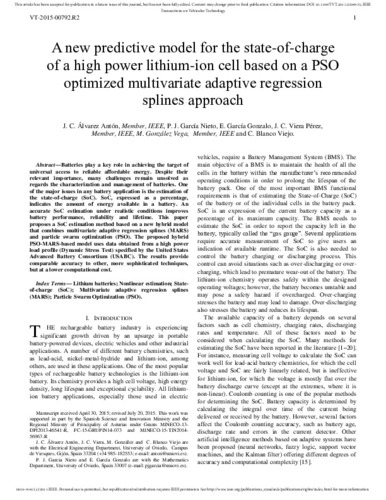A new predictive model for the state-of-charge of a high power lithium-ion cell based on a PSO optimized multivariate adaptive regression splines approach
Editor/Coord./Trad.:
Palabra(s) clave:
Battery modeling
MARS
State of charge
PSO
Fecha de publicación:
Editorial:
IEEE
Versión del editor:
Citación:
Descripción física:
Resumen:
Batteries play a key role in achieving the target of universal access to reliable affordable energy. Despite their relevant importance, many challenges remain unsolved as regards the characterization and management of batteries. One of the major issues in any battery application is the estimation of the state-of-charge (SoC). SoC, expressed as a percentage, indicates the amount of energy available in a battery. An accurate SoC estimation under realistic conditions improves battery performance, reliability and lifetime. This paper proposes a SoC estimation method based on a new hybrid model that combines multivariate adaptive regression splines (MARS) and particle swarm optimization (PSO). The proposed hybrid PSO-MARS-based model uses data obtained from a high power load profile (Dynamic Stress Test) specified by the United States Advanced Battery Consortium (USABC). The results provide comparable accuracy to other, more sophisticated techniques, but at a lower computational cost
Batteries play a key role in achieving the target of universal access to reliable affordable energy. Despite their relevant importance, many challenges remain unsolved as regards the characterization and management of batteries. One of the major issues in any battery application is the estimation of the state-of-charge (SoC). SoC, expressed as a percentage, indicates the amount of energy available in a battery. An accurate SoC estimation under realistic conditions improves battery performance, reliability and lifetime. This paper proposes a SoC estimation method based on a new hybrid model that combines multivariate adaptive regression splines (MARS) and particle swarm optimization (PSO). The proposed hybrid PSO-MARS-based model uses data obtained from a high power load profile (Dynamic Stress Test) specified by the United States Advanced Battery Consortium (USABC). The results provide comparable accuracy to other, more sophisticated techniques, but at a lower computational cost
ISSN:
Patrocinado por:
This work was supported in part by the Spanish Science and Innovation Ministry and the Regional Ministry of Principality of Asturias under Grants MINECO-13- DPI2013-46541-R, FC-15-GRUPIN14-073 and MINECO-15-TIN2014- 56967-R
Colecciones
Ficheros en el ítem





